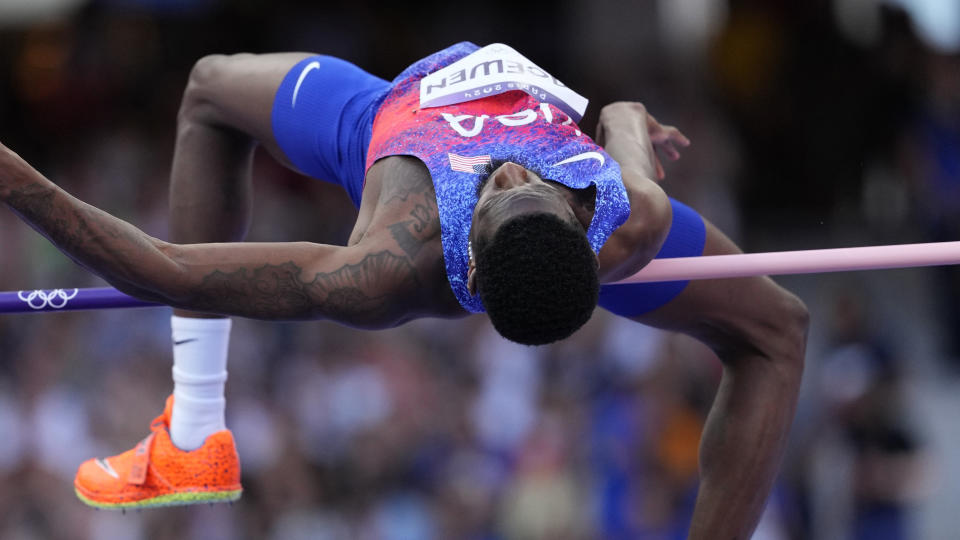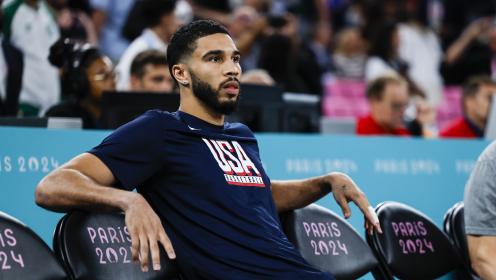
Medal table | Olympic schedule | How to watch | Olympic news
SAINT-DENIS, France — At the end of Saturday’s epic two-plus-hour men’s high jump competition, the two competitors who were tied for first place faced a life-altering decision.
Did they want to share Olympic gold? Or did they want to compete in a jump-off to determine an outright winner?
New Zealand’s Hamish Kerr, 27, had discussed this exact scenario with his team after a training session three or four months ago. Someone asked Kerr if he would share the gold the way that best friends Gianmarco Tamberi of Italy and Mutaz Essa Barshim of Qatar famously chose to do in Tokyo three years ago.
While Kerr acknowledged that show of sportsmanship “was such a special thing for the sport,” he told his team that he preferred to “add to the history of the sport in a different way than had already been done.” That day he made up his mind that he would jump-off and go for outright gold if he were ever in that position.
“For me, I would have been so proud coming second in a jump-off,” Kerr said. “Probably prouder than sharing the gold medal to be honest.”
America’s Shelby McEwen, 28, never faced the decision whether to jump-off before Saturday, nor had he spent time considering how he would handle that scenario if it arose. Exhausted and heavy-legged yet also eager to win outright, McEwen was open to either option when he and Kerr briefly chatted alongside the high jump pit.
“Let’s jump off,” Kerr said.
“I’m all for it,” McEwen responded.
And just like that it was decided.
“I maybe would have shared it with him, but he wanted the jump-off and I agreed to it,” McEwen said. “I wasn’t going to go back and forth and argue with him.”
Kerr went on to win the jump-off, the “Flying Kiwi” clearing the bar at 2.34 meters after both he and McEwen had both missed attempts at 2.38 and 2.36. When he knew he’d won, a weary Kerr summoned the energy to pop up and sprint across the Stade de France’s grass infield in celebration of New Zealand’s first high-jump medal.
“If I hadn’t cleared that jump or one very soon, we’d probably still be out there,” Kerr quipped more than an hour later.
For someone who had a gold medal slip through his grasp, McEwen showed no signs of regret. He was content with a new lifetime-best jump of 2.36 meters before the jump-off and with the silver medal draped around his neck.
“I came up short of the gold, but I’m thankful for what I got,” McEwen said.
Ten years before he contended for high jump gold at the Paris Olympics, McEwen was known for his leaping ability in a different sport. The then-teenager won the 2014 Jordan Brand’s “First to Fly” dunk contest in Las Vegas, taking off from the free throw, soaring through the air and finishing with an explosive one-handed dunk.
McEwen, a native of Abbeville, Mississippi, grew up doing flips on hay bales, trampolines and anything else he could find. He dunked for the first time at the end of seventh grade. By eighth grade, he was dunking in games.
Though McEwen messed around with high jump for one year in high school and won the Mississippi state championship, he considered himself a basketball player in those days. Only after his basketball career stalled out at Northwest Mississippi Community College did he start to dabble with high jump again.
Competing as an unattached athlete, meaning that he didn’t represent his school, McEwen defeated high jumpers with college scholarships and years of practice under their belt. That caught the attention of a variety of college coaches and set him on a course to compete for high jump gold on an Olympic stage at Stade de France.
McEwen has long since given up on the idea of playing in the NBA, but there is one hoop dream that has been hard for him to fully relinquish.
Says McEwen with a smile, “If the NBA ever wants to get me in the dunk contest, I’m all in.”

